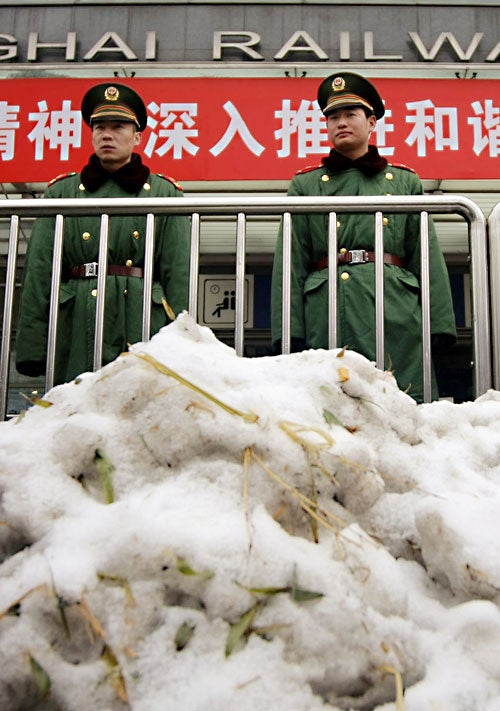Blizzards bring chaos to China's New Year holiday migration

Your support helps us to tell the story
From reproductive rights to climate change to Big Tech, The Independent is on the ground when the story is developing. Whether it's investigating the financials of Elon Musk's pro-Trump PAC or producing our latest documentary, 'The A Word', which shines a light on the American women fighting for reproductive rights, we know how important it is to parse out the facts from the messaging.
At such a critical moment in US history, we need reporters on the ground. Your donation allows us to keep sending journalists to speak to both sides of the story.
The Independent is trusted by Americans across the entire political spectrum. And unlike many other quality news outlets, we choose not to lock Americans out of our reporting and analysis with paywalls. We believe quality journalism should be available to everyone, paid for by those who can afford it.
Your support makes all the difference.China's worst snowstorms in 50 years have brought the world's biggest annual human migration to a standstill, leaving millions of migrant workers stranded ahead of a week-long festival to celebrate the Chinese New Year. Icy temperatures, snow and sleet across the south, centre and east of the country have closed railways, motorways and airports and there are fears of riots as discontented travellers vent their frustrations.
The bad weather, which started on 10 January, could not have come at a worse time. More than 200 million migrant workers travel between cities and their rural homes to be with their families for the Lunar New Year holiday.
State television showed Premier Wen Jiabao using a megaphone to reassure travellers stuck at Changsha railway station in the central province of Hunan. "I am deeply apologetic that you are stranded and not able to go home earlier," he told them. "We are doing our best to fix things up and, when the electricity is back, then the trains can run, so it will not be long before you can all go back home to celebrate the New Year."
China's elite Politburo held an emergency meeting and President Hu Jintao has made disaster relief a top priority. But heavy snowfalls have made getting coal and food to stranded passengers difficult. More than 20,000 trucks and cars were stranded on the motorway between Guangdong and Hunan yesterday. Fuel supplies are dangerously low and there are concerns of an escalating energy crisis.
The lunar holiday starts on 7 February and officially lasts for a week, although many Chinese stay home for much longer as it is the only chance they get to see their families during the year.
The movement of such a vast number of people always puts huge pressure on the transport network. The railways expect to carry nearly 180 million people between 23 January and 2 March. At least 15 airports have been closed at various times and 6,500 flights have been cancelled.
In Guangdong province, officials advised two thirds of its 30 million migrant workers to stay in the cities. More than half a million rail passengers are stranded in Guangzhou because the southern end of the Beijing-Guangzhou line is blocked by heavy snow in Hunan. Armed police were deployed to keep order after scuffles at the railway station in the normally temperate city.
The Civil Affairs Ministry said the number of weather-related deaths since 10 January 10 was 24. A further 25 people died when their bus skidded off an icy mountain road in Guizhou.
Houses and agricultural land have been destroyed, leading to economic losses totalling £1.5bn, according to the Xinhua news agency.
Join our commenting forum
Join thought-provoking conversations, follow other Independent readers and see their replies
1Comments